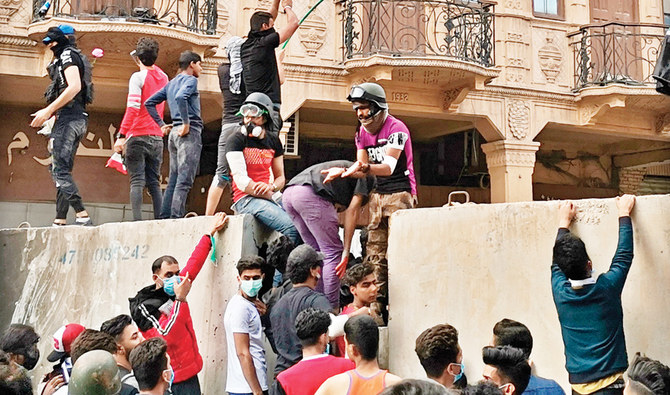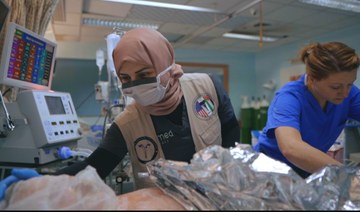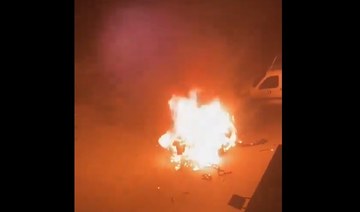BAGHDAD: A senior adviser to Grand Ayatollah Ali Al-Sistani has told Arab News that he does not support the continuation of the government of Prime Minister Adel Abdul Mahdi and that the existing political forces did not press for early parliamentary elections with a new election law and an electoral commission. Baghdad and nine southern Shiite-dominated provinces have endured mass demonstrations against the government since Oct. 1.
More than 300 demonstrators have been killed and 15,000 others have been injured, mostly in Baghdad, due to bloody crackdowns led by Abdul Mahdi’s government and his Iranian-backed allies.
Al-Sistani is the leader of the world’s Shiite community and the most influential cleric in Iraq and has been the godfather of the political process since 2003. No government or prime minister can survive without Al-Sistani’s support and blessing.
Protesters, initially protesting against corruption, unemployment and lack of daily basic services, were brutally repressed in the first week of October by Abdul Mahdi’s government and his Iran-backed allies, killing more than 147 demonstrators and wounding more than 6,000 others with live ammunition and tear gas canisters, which stopped demonstrations for two weeks.
But demonstrations resumed on Oct. 25 after Al-Sistani announced his support and the Iraqi government vowed not to use live ammunition.
The return of the protests was accompanied by increasing demands to overthrow Abdul Mahdi’s government and the holding of early national parliamentary elections preceded by the change of the election law and the electoral commission.
Abdul Mahdi and his allies from the political forces announced their agreement to meet the demands of the demonstrators except the dismissal or resignation of Abdul Mahdi or early elections.
PM’s survival
The prime minister’s allies insist on his survival, accompanied by a significant increase in killings, kidnappings and arrests of activists and journalists, with the promotion of news that they have an agreement with Al-Sistani that allows the continuation of Abdul Mahdi’s government, new ministerial and constitutional amendments and a set of important laws, without holding early elections.
Al-Sistani’s office denied that they had concluded such an agreement or that they had anything to do with it.
“The real conviction is the conviction of the people. We have no guardianship over the people, but we support it because the constitution says they are the source of powers,” Sistani’s top aid told Arab News.
“We support peaceful demonstration because it is the right of the citizen … If it remains peaceful, it will affect the state’s convictions.
“We have no confidence that those (political forces) will be able to solve the problem. We see that they are part of the problem, not part of the solution and unless there is a real change within the constitutional items, the problem will remain the same.”
FASTFACTS
• Abdul Mahdi and his allies from the political forces announced their agreement to meet the demands of the demonstrators except the dismissal or resignation of the government, or early elections.
• Ali Sistani’s top aid tells Arab News that the grand ayatollah does not suppport the continuation of the present government in Iraq.
Iraq ranks high on the list of the most corrupt countries. The system of political, sectarian and ethnic quotas adopted by Iraqi politicians since 2004, which includes the three presidencies and ministries and advanced positions in all state institutions, contributed to the spread of financial and administrative corruption and provided the required protection for corrupt politicians.
“There have been no real treatments for corruption over the past years. Corruption is rampant ... because of the weakness of the judiciary and the regulatory authorities, some of which have sought to use corruption cases to blackmail and enrich themselves.
“Officials are getting rich at the expense of the people. Corruption whales became powerful, while the qualified people have left Iraq and the graduates do not find jobs.
“We have no hope in the existing political forces and the chances of continuation of this government are very small. “They should all leave. This political class must leave.”
Al-Sistani has recently intervened in major events, as happened when the Iraqi Army collapsed and Daesh overran one-third of Iraqi territories in the western and northern parts of the country in the summer of 2014 and advanced toward Baghdad, when he issued an edict (fatwa) demanding that people take up arms and volunteer to support Iraqi forces in their fight against Daesh. Sistani’s intervention this time appeared gradually and through Friday sermons.
Strongest sermon
The last Friday sermon was the strongest to date, as Al-Sistani’s told his followers: “If those who have power (now), think they can evade real reform, with procrastination, they are delusional. The aftermath of these protests will not be the same as before. They should be careful.”
This was understood by most politicians and observers as a yellow ultimatum, which could soon be followed by a warning of expulsion or paralysis of civilian life.
“We do not interfere with particles. We have constitutional mechanisms that we do not want to get out of, but when we found that these mechanisms were tailored to the size of the existing political forces, we demanded a new electoral law that would ensure a genuine representation of the people and a new electoral commission that people trust will safeguard their choices,” Al-Sistani’s aid said.
“We will not allow things to descend into chaos. This is not an option. Our biggest concern is that the law will weaken further, which means slipping into infighting.”
Iran’s blatant interference in Iraqi affairs, reflected by the statements of Iran’s Supreme Leader Ali Khamenei, who was publicly demanding an end to the demonstrations in Iraq and Lebanon, and the involvement of Gen. Qasem Soleimani, commander of Iran’s Revolutionary Guards, in the crackdown on protesters, has angered Al-Sistani. This was evident in his three previous speeches.
“We have a real problem: Iraq is negatively affected by the (regional) environment. We will not allow Iraq to be a battleground for any regional or international party ... we will not allow anyone to interfere in the affairs of Iraq, whether it is a friend or an enemy, because all interventions are aimed at serving special ambitions,” Al-Sistani’s aid said.
“He will not leave the people. If the people’s demand is for early elections, then we support early elections, and if they want to change the (political) system, we support it … and if they say that they do not want this government, we support it.
“Our position is clear and unambiguous. We are with the people in what they want ... and Al-Sistani has not used its strongest weapons yet.”

























